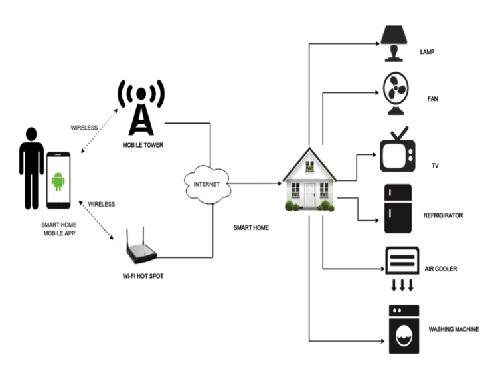
Thanks to IoT software development, a wireless home automation system can be life-changing. Therefore, using it can make your existence much easier because it allows any user to control an electrical device from a computer or smartphone.
Before investing in a home automation system, however, make sure you find the right one for your needs. Moreover, maybe you would also like to consider the technology used by the product and compatibility with your devices.

Which are the most frequently used technologies in wireless home automation systems?
Wi-Fi: Do you have an existing Wi-Fi network in your house? Suddenly everything becomes easy. The smart home appliances are designed to function with the existing Wi-Fi network. However, too many appliances connected to the same network can slow down the response from those devices. Keep in mind that Wi-Fi is a power-hungry technology.
Li-Fi: This relatively new technology uses light for device communication. Using Li-Fi technology comes with some advantages such as a wider bandwidth channel, it functions in areas susceptible to electromagnetic interference and has a notably higher speed. Those of you who are energy conscious might want to take into consideration this technology. It is often preferred over Wi-Fi, Bluetooth or infrared.
Bluetooth: The good old Bluetooth is now used by companies that produce smart light bulbs and smart door locks. Using this technology in a wireless home automation system comes with some advantages. It consumes less power than the previous protocols and we can connect multiple products that have the same connectivity features.
Z-Wave: Using the same foundation as Wi-Fi – radio frequency (RF) waves – Z-Wave technology is nevertheless different in many ways. It is energy saving, enhances the communication between devices and is compatible with many brands. The protocol applies to thermostats, windows, security systems, locks and even to swimming pools.
ZigBee: Initially built for a commercial purpose, this advanced protocol is now in residential usage as well. It is low-power, low-cost, and based on an RF protocol used to create personal area networks. The protocol is highly customisable, and can operate on multiple devices at a time using low power.
So should we invest in a wireless home automation system?
The answer is yes. Think about it as a lifetime investment, enhancing the value of your house. This type of system offers:
• Safety, by giving you the possibility to install all those security systems.
• Convenience, making your life easier.
• Energy savings.
• Highly customisable.
• Easy installation.
Whether you choose to use it or not, the smart home industry is in full development with companies working hard to deliver better and more cost-efficient technologies.

© Technews Publishing (Pty) Ltd. | All Rights Reserved.